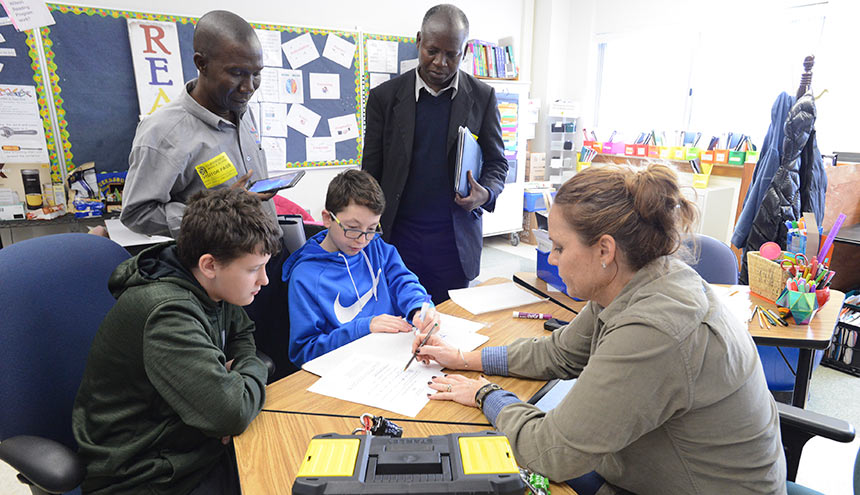They have shivered. They have seen snow for the first time, and tried bowling. And they have been introduced to a washing machine and a dryer, which one of them nicknamed, in awe, “the sunshine machine.”
In three days, this foursome of teachers from Uganda will fly back to Africa after spending two weeks in the Capital Region working with area educators and learning how to effectively create a much-needed teacher university in their own country. The global visit was coordinated by the Capital Region Teacher’s Center and The Giving Circle, an area not-for-profit.
The Ugandan teachers have been learning about white boards, teacher training, math and movement, art, laptops, lesson plans, and vision statements. With the help of teachers and host families, Moses Wambi, Cecelia Kagya, Emanuel Humphrey Gusango and Stevenson Magoma have been exposed to far more than just the cold.
“At the airport we were freezing,” said Magoma, who, like the others, was presented with warm coats, hats and gloves upon arrival in the United States.
The Giving Circle has built schools and student housing in Uganda, among many other projects. Right now, a typical class there is 60-80 students with one teacher lecturing. The Giving Circle has a vision of creating a teaching university to inspire new teaching methods, better prepare and retain teachers.
Mark Bertrand, founder of The Giving Circle, said 30 percent of Ugandan teachers failed the test for the grade they are teaching.
“We had a first conference last year. We asked them what the holes were. We’re looking for partnerships with American educators,” said Bertrand, who added three American teachers would be visiting Uganda in February.
“This will guide us in making constructs and to help organize a teachers’ college,” said Gusango. “We are seeing real-life situations and seeing people demonstrate.”
Bertrand said the program will begin with 10 very poor schools in Uganda, where poverty is “mind numbing.” The journey to start a teacher’s college, he said, began with a visit to the source of the Nile River, where those involved threw pebbles in the river to visualize the ripples they will be sending out.
Teacher Liz Daley, a Queensbury Faculty Association member, said the Ugandans’ visit is also benefiting New York school districts because it allows them to explore global models.
“We’re working with our teacher on developing the notion of global citizenship,” Daley said. “Our teachers need more global engagement.”

The African foursome visited Queensbury High School, a State University of New York Plattsburgh campus in Glens Falls, Cambridge Central School, and elementary and middle schools in Guilderland. They also learned about integrating art and music at Shaker Road Elementary in Colonie and science at Shenendehowa.
From English Language Arts teacher Lauren Surber, a member of the Queensbury Faculty Association, they learned how to get students involved in studying O. Henry.
“How does the use of situational irony in literature help readers to discover themes?” asked Surber. The specific Lesson Essential Question was: How did O. Henry’s life experience play a role in his storytelling?
Students opened up their individually owned Chrome Books and began searching the teacher-compiled classroom notes with the intensity of Sherlock Holmes. They examined his past — his first job was a licensed pharmacist — his pen name, the authors whom he liked to read. The teacher had also downloaded TED talks in irony for them to watch.
“This is the kind of thing that is not very common,”’ said Wambi, as he observed. “We’re focused on language and structure…. The current system has gaps.”
“It was scary to do this at first,” admitted Surber, who was joined by fellow teacher and Queensbury FA member Michelle Trimarchi, in visiting each cluster of students.
Surber described this kind of learning as ‘flipping the classroom.’ When students are given a novel to read, they have activities to complete as they go, and they can move at their own pace. She feels it makes them more invested.
The Ugandan teachers took photos and watched how students unfolded answers from the information they searched through classroom notes on their web quest.
Kagya said being a teacher has given her independence, although it was not her first choice of a career because the pay in Uganda was minimal. She has earned different levels of expertise, and is now head teacher at a public school.
Gusango said good teachers often “run to the city” where there is more money to be earned and better conditions than dirt floors and tin roofs. A teacher’s university can help change that by instilling passion, national and international concepts, and academic and professional freedom.
“This,” he said, “will cause people to dream better.”